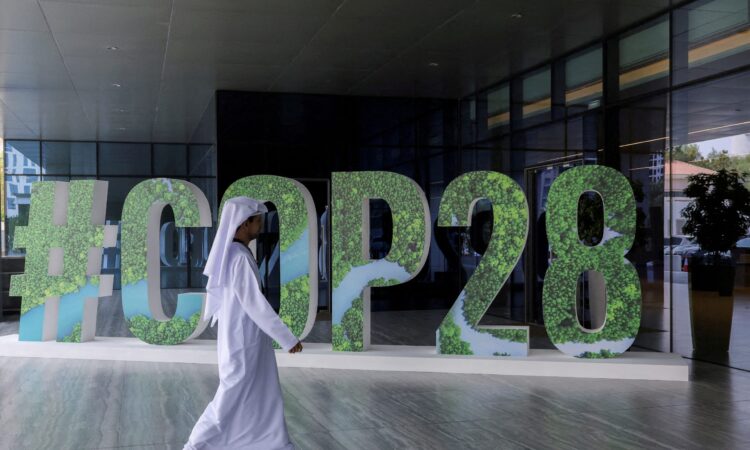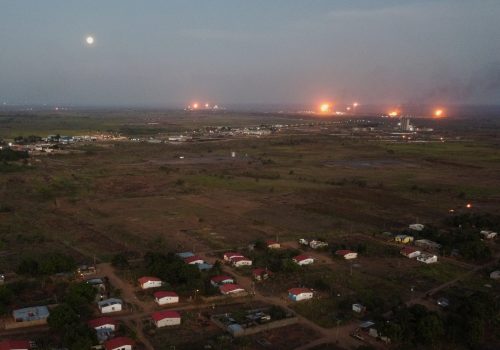Live expertise from COP28 as the world tries to join together in the fight against climate change

November 30, 2023 • 3:21 pm ET
Live expertise from COP28 as the world tries to join together in the fight against climate change
This year, the world has seen a slate of devastating weather events—and geopolitical tensions that have raised global concern about access to reliable energy. How will global leaders respond?
Experts from across the Atlantic Council are on the ground in Dubai for the United Nations Climate Change Conference, also known as COP28. There, they’ll be drawing back the curtain on the convening, analyzing how global leaders respond to climate change’s greatest challenges, and offering expert insight on the biggest developments in everything from climate finance to the energy transition to the global stocktake.
Get your exclusive peek at what the next global response to the climate crisis looks like, courtesy of our experts below.
Check out all our COP28 programming here.
The latest from Dubai
NOVEMBER 30 | 8:12 PM GMT+4
An early deal brings signs of hope for COP28
The first day of COP28 has opened with a historical deal: The parties agreed on the implementation of the loss and damage fund that was first announced last year at COP27. While parties agreed at COP27 to create the fund, it was unclear where the fund would be located and how much money developed countries would commit to it.
Now, with this new announcement, countries are beginning to commit to the fund. The United Arab Emirates and Germany each committed one hundred million dollars, while the United States and Japan have also contributed. The fund is central to climate justice for the countries that have contributed the least to climate change but are the most vulnerable to its effects.
Only weeks ago, negotiators and world leaders expected COP28 to be a difficult climate conference with uncertainty and disagreements about how the fund should be implemented and operationalized. Nevertheless, this early deal on the loss and damage fund will set the scene for hopeful negotiations as the week continues.
—Sabrina Nagel is senior advisor for global policy and finance at the Adrienne Arsht-Rockefeller Foundation Resilience Center
NOVEMBER 30 | 7:45 PM GMT+4
Long-term climate financing remains elusive. A NATO-style spending target could help.
By Francis Shin and Théophile Pouget-Abadie
At the 2006 Riga summit, NATO leaders made a pledge to spend 2 percent of their gross domestic product (GDP) on defense. This moment marked a significant shift for the alliance, offering a way to both measure political will and ensure that existing and new members meaningfully contributed to the Alliance’s efforts. The target is remarkably simple: It essentially tracks members’ defense ministry budgets. Could the establishment of a spending target for the energy transition spark a similarly significant global shift?
Decarbonizing has emerged as one of most important tools for the European Union (EU) to ensure its long-term security and sovereignty: both to address the physical risks stemming from climate change and to reduce oil and gas dependencies, particularly on Russia. So far, European member states have committed insufficient funds to meet their decarbonization objectives. The European Commission estimates that an additional seven hundred billion euros of combined public and private investment is needed each year across the entire EU bloc to meet its energy transition targets and combat climate change.
Europe is currently far off track, with a spending gap equivalent to 0.73 percent of the EU’s GDP for non-transport investment and public spending, or about 101 billion euros. All but two EU countries (Lithuania and Czechia) have national spending gaps incapable of being filled by EU spending alone due to these members not having enough grants available to them. While the EU has set ambitious energy-transition goals through programs such as NextGenerationEU, the European Green Deal (and the associated Fit for 55 package), and the REPowerEU Plan, it now needs the means to finance them.
To turn the tide, EU members and like-minded allies should set national-level climate spending targets, based on a percentage of their respective annual GDPs, to address these deficits. Within Europe, a climate spending target would put pressure on countries that have expressed reservations about joining in EU-level decarbonization goals. Poland, which retains the most reliance on coal for its energy needs, suggested that it would appeal against the Fit for 55 program, raising concern among other EU members on how staunchly committed Poland might be to cut carbon emissions.
Agora Energiewende and the European Commission concluded the overall annual GDP percentage investments required for hitting existing 2030 carbon emissions targets was 2.5 percent. That’s where discussions should start.
Of course, EU members’ needs will vary. Countries that haven’t spent as much on their energy transitions—or that are still reliant on fossil fuels—will need to spend more to address decarbonization deficits and improve electricity grids. And while some countries have already spent significant amounts and are closer to reaching their decarbonization goals, they should still seek to meet the 2.5 percent target, instead directing the funds to developing countries or international climate-change mitigation projects. This would express solidarity with fellow EU members as well as encourage decarbonization beyond Europe itself.
—Francis Shin is a research assistant at the Atlantic Council’s Europe Center. Théophile Pouget-Abadie is a nonresident fellow with the Atlantic Council’s Europe Center and a policy fellow with the Jain Family Institute
NOVEMBER 30, 2023 | 6:27 PM GMT+4
Kicking off with a bang on loss and damage
What should climate watchers take away from day one of COP28? “Movement and progress,” Jorge Gastelumendi, interim director of the Adrienne Arsht-Rockefeller Foundation Resilience Center, tells us from Dubai.
Before the first day closed, countries were able to reach a deal on a loss and damage startup fund, with both the United Arab Emirates and Germany pledging one hundred million dollars to offset disaster-induced costs in vulnerable countries.
It will also create an “open window” for insurance companies to support developing countries, Gastelumendi notes.
Watch more
WATCH | On the ground in Dubai, @ArshtRock’s @Gasteluj shares the latest insights from #COP28 about the launch of a new loss and damage fund for developing nations on the first day of the conference. #ACatCOP28 pic.twitter.com/rdVUJmj8N5
— Atlantic Council (@AtlanticCouncil) November 30, 2023
Further reading
Tue, Oct 24, 2023
Why COP28 is right to prioritize global methane and flaring reduction
Issue Brief
By
Flaring and methane emissions from oil and gas are a substantial source of greenhouse gas emissions globally, but the funding, technology, and business practices are available to bring these emissions to near-zero. The COP28 platform can accelerate these solutions.
Image: A person walks past a “#COP28” sign during The Changemaker Majlis, a one-day CEO-level thought leadership workshop focused on climate action, in Abu Dhabi, United Arab Emirates, October 1, 2023. Photo via REUTERS/Amr Alfiky







